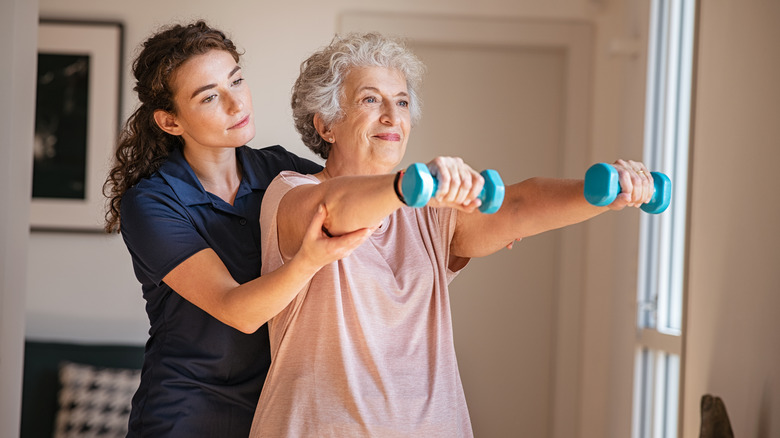Why Weight Loss Gets Harder As You Grow Older
Growing old comes with many changes and the challenge of adapting to new circumstances. We all experience bodily limitations — diminished mobility, lower fluid retention, decreasing bone mass — as well as more superficial things like gray hairs. And of course, there are certain activities one can easily do in their younger years, but as years pass, they become more difficult — or even impossible. One change that is inevitable for all of us is the effect of aging on losing weight.
Clinical researchers suggest that aging makes it harder for someone to lose weight, making it increasingly difficult to stay in shape. Why? Metabolism slows down, the body loses muscle mass and experiences changes in hormone levels, people must adopt different lifestyles, and time becomes harder to come by. Of course there are many factors, but these are the big ones. Let's take a deeper look into how these changes affect weight loss.
Metabolism slows down as a person ages
One of the primary reasons it's hard to get in shape as you grow older is due to the slowing metabolism. Metabolism is the process of converting food and drink into energy. During this process, the calories in the food and drinks you consumed mix with oxygen to produce the energy that the body needs. With a slow metabolism, less energy is burned, meaning more is stored in fat cells. It's important to note that even at rest, the body uses this energy to function properly.
Based on a 2021 study published in Science — and explored in an article in Harvard Medical School — metabolism tends to slow down with age. It was further revealed that metabolism peaks during the younger years and slows down as years pass. This is why healthy eating becomes more important with age, and some foods become not worth the calories.
The body tends to lose muscle mass as soon as you hit 30
Another reason why it seems impossible to lose weight when one gets older is because of the loss of muscle mass. Despite remaining active, losing muscle mass is unpreventable. An article published by The New York Times states that the body loses muscle mass as soon as a person hits their 30s. The body continues to lose about 3 to 8% per decade, per a National Institutes of Health (NIH) review.
This decline in muscle mass is called sarcopenia. Having age-related health issues like arthritis can also bring about this muscle mass decline. Crucially, declines in muscle mass also affect metabolism — as the muscle mass decreases in the body, the metabolism slows down, which means the body needs fewer calories, making it increasingly difficult to lose weight. (Don't worry: There are several workouts that can help boost your muscle mass.)
Changes in hormones can lead to weight gain
Women undergo the menopausal transition from the age of 45 to 55. This process involves a significant decline in the level of estrogen in the body. During menopause and perimenopause — the stage leading up to menopause — women may gain body fat and will find it harder to lose it. These fats also tend to be stored around the waist rather than on the hips and thighs. And as the estrogen level of the body drops, the metabolism slows down.
Men also experience a shift in their hormone levels as they age. When they hit the age of 40, the testosterone in their bodies tends to start decreasing. Testosterone is the primary hormone that regulates fat distribution, muscle strength, and muscle mass in the body. Once it begins to decline, the body will have difficulty burning calories, which can result in weight gain.
The body experiences a lifestyle change
As you grow older, the physical activities you can do become limited, and the amount of activities in your daily routine seems to lessen. Sedentary behavior is more prevalent in older people than younger as the former group leans toward seated activities and hobbies like reading or watching movies. And an inactive lifestyle is likely to result in weight gain.
FamilyDoctor.org highly recommends people over the age of 65 spend at least 2.5 hours of moderate aerobic exercise a week, but this can be a challenge for many of them. Some of these adults are inactive not because they choose to be but because they have bodily restrictions. Older adults often possess several health conditions, such as back pain, sore knees, heart conditions, and even lung disorders. These conditions heavily impact the ability of a person to exercise regularly.
Not enough time to shake off those extra pounds
Most people struggle to make time for exercise on a regular basis, but it is especially hard for those who are older. A college student typically has more time on their hands compared to someone who's working in a managerial position. As you grow older, life gets crazier, with so many things to do in so little time.
When your email is getting out of hand and your boss is asking for a late-night meeting — all while your kids need some tending to — the last thing you probably think of is making time for a workout. In fact, the first thing you'd probably scratch off your list might be yoga class, or going for a walk. It's not helpful that a busy schedule tends to stress a lot of people, which can also cause weight gain. When you're stressed, your body produces more cortisol — a hormone known to increase one's appetite.





